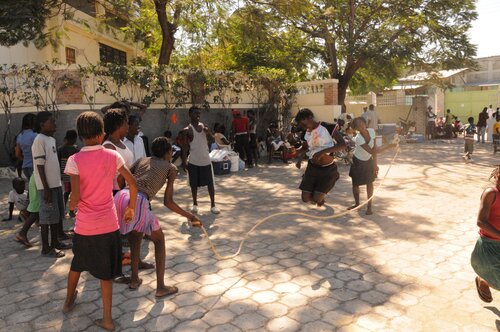UHC2030 hosted its annual UHC Day parliamentarian town hall to...
27 September 2022
Local leaders and communities must play a central role in the transformation of global health agreements into local realities. Only then can we deliver on our promise to leave no one’s health behind.

Local governments have the responsibilities, though often not the powers, to deliver around 65% of the Sustainable Development Goal (SDG) targets.
There’s no question about it: we cannot achieve universal health coverage (UHC, SDG target 3.8), or indeed any of the SDG health targets, without the local governments that are in direct contact with local populations.
Local governments play a crucial role in planning and delivering the services necessary to achieve UHC. They have the ability to build primary health care systems that are truly “caring” and people-centred, as they are directly responsible for protecting the health and well-being of their constituents. They are also closest to the communities and individuals they serve, often acting as the first point of contact. This is why we must strengthen the legal, institutional and fiscal frameworks that provide them with the necessary decision-making power to respond to people´s needs, especially those related to health and social protection.
That said, local governments alone cannot achieve health for all. We need to support meaningful social participation and empower communities through formal participatory governance mechanisms.
Civil society and community participation helps hold governments accountable and improve the responsiveness of UHC policies. They help ensure programmes are integrated with overall social protection policies, reach their full impact and remain relevant for end-users. This is particularly important for women and girls, as well as communities who often find themselves on the margins of society, such as migrants, persons with disabilities, persons living in poverty and the elderly. Women also shoulder the main burden for protecting our health at the frontline and in communities and must be supported in this work.
These are a few of the reasons local governments must be part of global health conversations. UHC2030 – the global movement to build stronger health systems for UHC – is honoured to collaborate with United Cities and Local Governments (UCLG).
Our collaboration emphasizes the importance of achieving UHC to support resilient and thriving communities. We facilitate dialogue between local government representatives and UHC advocates on how to build a safer and healthier future for everyone by making our health systems, and therefore our cities and territories, more resilient and equitable.
We welcome the UCLG Pact for the Future as an important step to make the right to health a reality for all.
The UCLG 7th World Congress and Summit of Local and Regional Leaders
The UCLG 7th World Congress and Summit of Local and Regional Leaders is taking place from 10 to 14 October 2022 in Daejeon, South Korea. It is the largest gathering of mayors, presidents of associations, councillors and local and regional practitioners from around the world. It also gathers the most influential local and regional leaders, partners and actors for building ever more resilient, sustainable and peaceful communities.
More UHC2030 News
A global health financing emergency threatens progress toward...
UHC2030 at HSR2024: Advancing equity and inclusion in health systems through civil society knowledge
UHC2030, in collaboration with the SUPPORT-SYSTEMS research...
